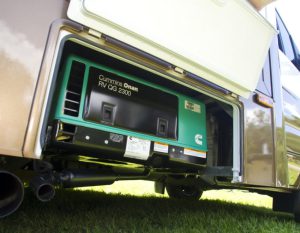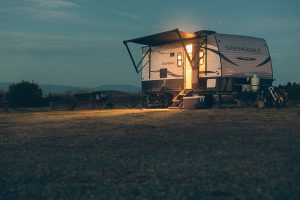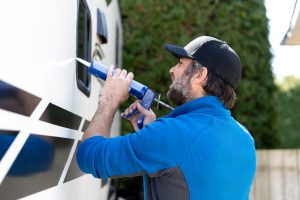For some of us, our RV generator is the lifeblood of every RV adventure. It allows us to go where we want without worrying about electrical hookups. It keeps our batteries charged even when we camp in the most remote areas.
Almost everyone who owns an RV also owns a generator. It may be a small portable unit only used in emergencies, a back-up power source for solar panels, or a larger, built-in generator that gets used on every trip. It gives us power wherever and whenever we need it.
That power is usually right there, at the touch of a button.
But sometimes it isn’t. If you’ve ever been at a remote campground and had your generator conk out in the heat of the summer, you know it puts a damper on your vacation. Like any other machine, your generator needs maintenance.
We talk a lot about maintenance for your entire RV. It helps you avoid breakdowns, reduces RV repair costs, and generally makes trips more pleasant. Maintaining your generator doesn’t take a lot of work and you won’t regret it when the hook-ups go down and your batteries get low.
RV Generator Maintenance Tips and Hints
Know Your Power
The first step in good RV generator maintenance is knowledge. A generator is simply an engine that creates power for your RV. It uses fuel to create the electricity which in turn charges your 12V batteries and runs your higher power-usage amenities.
Common brands of RV generators include Honda, Westinghouse, Durostar, Yamaha, and Onan RV generators. If you own a fairly new Class A or larger Class C motorhome it likely has a compartment for and comes with an onboard generator.
Older and smaller motorhomes and travel trailers often don’t have a dedicated place for a built-in generator.
A Class A or Class C motorhome will usually come with a generator that produces between 3,000 and 12,000 watts of power. How much power you need depends on how you plan to use it.

Cummins, which makes Onan RV generators, estimates generator needs based on vehicle type and the number of air conditioning units. A Sprinter Van (Class B RV) probably doesn’t need more than 3,600 watts. A Class C with a single AC unit can get by with 4,000 watts. A 5th wheel with two air conditioners may draw up to 8,000 watts, and a big Class A Motorhome with 3 AC units up to 12,000 watts.
Here are some common power drains:
- AC: 2,400 watts per unit with surges at start-up
- RV refrigerator: 400-1,200 watts
- Microwave: 1,000 watts
- Stove: up to 2,500 watts
- Laptop: 25-200 watts
- TV: 150-400 watts
- Coffee maker: 600-1,750 watts
If you’re purchasing a new RV, the generator will be suited to the amenities. If you’re adding an onboard generator, you’ll need to figure out the size you need. Determine how much power you use regularly and choose an appropriate size. In general, the larger the RV, the more power you’ll need.
Generators can be portable or built into your RV. To get the full run-down on each type, including sizes and capacities, read our Choosing an RV Generator article.
Clock Your RV Generator Hours
A vehicle’s past use is based on mileage. A generator’s past use is based on run hours. You can use these milestones to determine your maintenance schedule. Know how many hours are on your generator when you get it.
Here are some general RV generator maintenance milestones:
- Look your generator over every 8-10 run hours. This is far easier with some generators than others. But putting your eyes on it regularly helps you know how it should look and reminds you to do other routine maintenance.
- Replace oil and air filters every 100-150 run hours in gas or propane generators.
- Replace fuel filters every 400-500 run hours.
- Check your air inlet system every 50-100 run hours. These screens and tubes can get blocked, so clear out that debris!
- Replace spark plugs at 100 run hours.
- Change the oil at 100 run hours.
- Drain water from diesel generators every 100 run hours
Other regular maintenance includes checking the mounting of a built-in generator, regularly checking the wattage, checking fuel supply lines for damage, and making sure you have adequate ventilation.
Poor generator ventilation is a serious safety hazard. Make sure your RV has working carbon monoxide detectors.
Some of you will feel perfectly comfortable doing all of these chores yourself. Many of you will not, especially with a generator that’s tucked away inside your RV. Talk to your local RV repair and maintenance shop and make sure generator maintenance is included in your regular schedule.
Keep an RV Generator Log
Whether you plan to do RV generator maintenance yourself or not, keep a good record of the number of hours your generator runs. You may be surprised at how the hours add up and need to revise your schedule.
Most people will hit 100-150 run hours about once a year. If you don’t use your generator that much, 100 run-hour maintenance should still be done at least yearly.
Monthly Exercise
Motors need to move. Just like cars, your generator needs to run regularly. Once a month you should run your generator for about an hour. That doesn’t mean once a month during the summer, that means once a month all year round.
Make sure you’re at 50% load (minimum) for this workout. That means if you have an 8,000-watt generator, you need to run it at about 4,000 watts of power. Check your systems to find out which combination most easily makes up that load. It may be an air conditioner and an appliance, a heater and a water heater, or some other combination.
If you aren’t sure how to determine your load, check with your local RV repair shop. They will help you figure out how much power each of your systems draws from your generator.
Since you’re going to run your generator once a month, this is a good time for DIYers to check the oil.
Be a Smart RV Generator User
RV owners can get a lot of mileage (in this case run hours) from a good generator. But they need to use it properly. The first way to do that is to know your load limitations.
Not all generators are created equal. A 3,000-watt generator is not going to be able to handle full-time air conditioning and appliance usage on a Class A motorhome. Make sure you know how much power have, and how much power you use. Do not overburden your generator.
Generator use also needs to be tailored to your surroundings. Generators of all kinds make noise. While a large portable generator will be louder than a new, small, built-in style, you can still disturb your neighbors. Check your campground guidelines before you fire up the AC at midnight.
One of These is Not Like the Others
Every RV generator is different. Proper maintenance depends on the type of fuel used, the size, and the type. Only diesel generators need draining. Propane generators are lighter. Built-in generators use the fuel from your vehicle.
Because the models are so different, it’s up to the owner to learn about their system. Owner’s manuals and the experts at your local RV repair shop can provide the information you need about your unit.
Whether your RV is a 5th wheel with a big portable generator or a small Class C with a built-in inverter unit, you need to care for that valuable source of power. A well-maintained built-in generator may last between 15,000 and 20,000 run hours. For portable RV generators, the range is a little wider, from 10,000 to 25,000 hours.
If you’re buying a used RV, check how many run hours are on your generator. This gives you a general idea of how long it will last.
If your RV generator is not well-maintained, the results can be costly. A portable 3,600-watt unit can run around $500. A built-in RV generator of the same size will set you back several thousand dollars. A big 12,000-watt diesel Onan RV generator is a whopping $15,000.
The Bottom Line
Generators are what let us roam free and be self-contained on our RV adventures. Keeping yours in the best shape possible requires regular maintenance. Understanding your RV generator, knowing how much power you use, and keeping track of your run hours all help with general upkeep.
But your generator also needs regular service. Some of you may want to DIY, but you should have a professional take a look at it on a regular schedule. Talk to us at Leisure Coachworks about getting the most out of this essential piece of RV equipment.


